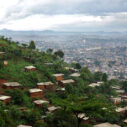
Search
Articles


Data of the Month
Cameroon has witnessed substantial economic growth in the new millennium, but what has happened with poverty? A recent OPHI Working Paper has indicated that monetary and multidimensional poverty decreased in Cameroon between 2001 and 2018, albeit slowly and to varying degrees across the different demographic, socio-economic, and spatial groups of the population.

Editorial – Dimensions 13
Last October, OPHI and the United Nations Development Programme launched the latest edition of the global Multidimensional Poverty Index, containing data disaggregated by gender, ethnicity, race and caste – key information to leave no one behind. In this edition of Dimensions, Kelly-Ann Fonderson briefly describes the main findings of this report.

Simulations and multidimensional poverty: reflections on a COVID-19 evaluation study
The current COVID-19 pandemic, which took hold in early 2020, put policymakers in a vexing situation. First, there is a high degree of uncertainty associated with both the effectiveness and potential side-effects of most policy measures aiming to curtail the spread of the virus, including the virus’ precise epidemiological characteristics. Secondly, much is at stake, including a significant number of premature deaths, extraordinary economic contractions, and the education of several young generations.













